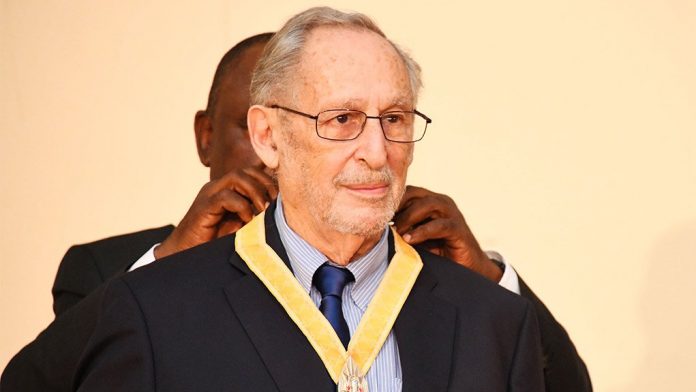By Jaime Uranovsky
Every year since 2003, the South African President bestows the National Orders upon individuals who “have played a momentous role towards building a free and peaceful democratic South Africa and improving the lives of South Africans in various ways”.
The Order of Ikhamanga is one of the six Orders (the highest and most prestigious awards granted in South Africa), and is bestowed upon those “who have excelled in the field of arts, culture, literature, music, journalism and sport”. In April this year, the Order of Ikhamanga was presented to eight people, including South African born journalism legend and anti-apartheid activist, Benjamin Pogrund.
Benjamin, who has lived in Israel for more than twenty years, is well known and highly respected for his prolific journalistic contribution both in South Africa and abroad, as well as for his dedication to human rights advocacy. While the list of his achievements and writing endeavours is difficult to summarise, his twenty-six years at the Rand Daily Mail during the height of apartheid speak for themselves of his courage and integrity.
He recounted, “We left [South Africa] in 1986. I was deputy-editor of the Rand Daily Mail, …which was too fiercely anti-apartheid; we were closed down by our business owners under pressure from the government. I was simply unemployable at that time… So Britain gave me sanctuary …and I was on Queen Street newspapers for eight years. Then we went to America where I was editing an international paper… then we went to Israel at the invitation of the late Rabbi Mickey Rosen, who asked me to come start a dialogue centre called Yakar… and we simply stayed on there.”
Despite living abroad, Benjamin feels deeply connected to South Africa and visits often to see his children and grandchildren. “I felt deeply honoured to be one of two dozen recipients of various orders…
I stood there…totally honoured to be in the presence of these, mainly, South Africans who had done the most amazing things in their lives… Because, I’m from this country, I come back a great deal, I write about this country, I comment on it all the time but I’m Israeli. And standing up there listening to the Soweto choir singing ‘Nkosi Sikelel’iAfrika’ was an intensely emotional experience.”
On being asked which story or event stood out to him during his career in South Africa, Benjamin explained, “The joke was that they closed the [Rand Daily Mail] to get rid of me because I was part of the furniture… I was hugely fortunate as a journalist because of the quality of the people I knew. And the important thing to a journalist… was that I had people whom I trusted to give me accurate information, even when they imperilled their own liberty. And they, in turn, trusted me to report accurately and that was it, when I think back, you know: the people I knew and whom I know. Nelson Mandela was a good friend. I was the first non-family person allowed to visit him in prison after about twenty years and I didn’t do so as a journalist but as a friend. But I had to give the government a promise that I wouldn’t write a word about it. Just imagine that scene! I was deputy-editor of a leading newspaper and I had to go to my colleagues and say, ‘I’m going to be seeing Nelson Mandela this weekend and I cannot write a word about it.’”
Benjamin’s writing career is far from over and his new book, a collection of essays assessing Robert Sobukwe’s legacy, will be released in South Africa this November. “I’m still totally steeped in South Africa even though I live in Israel and am occupied with Israeli affairs,” Benjamin said.
To read the June issue of the Chronicle online, click here
To read about Martin Margolius’ leap off Signal Hill, click here
To read about singing sensation Josh Abrams, click here
To find out more about the Winter Warmer Campaign, click here











